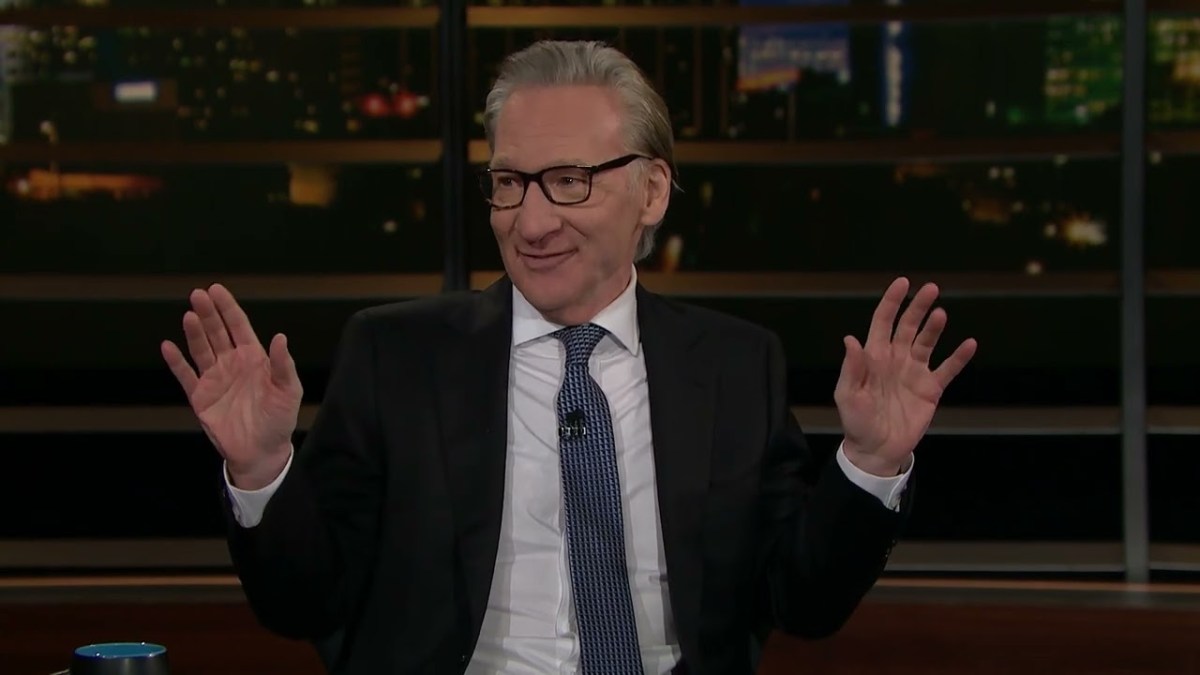Last year, Oscar season prompted Bill Maher to critique the dour tones of many of the nominated films. This time around, this week’s nominations made for a wider array of jokes in his opening monologue — including a comparison of Best Picture nominees All Quiet on the Western Front and Top Gun: Maverick. Quoth Maher: “One, they don’t know why they’re fighting. One, they don’t know who they’re fighting.”
Talk of war films provides a perfect segue to politics, with Maher both baffled by and frustrated with various news stories. These included a newly-elected member of Congress who gave out grenades as gifts and Donald Trump’s recent uptick in polls for the 2024 Republican presidential nomination.
Real Time has often featured criticism of social media, and this week’s episode featured a significant figure in that department: Frances Haugen, best known for her work bringing to light some of Facebook’s least savory practices. She has a new book, The Power of One, due out later this year.
Maher opened his questions to Haugen with a lengthy critique of TikTok and its effect on a generation’s attention spans. “Right now, there’s no incentive for TikTok to help you go to bed,” she said. They continued discussing TikTok for a while before bringing up Haugen’s work as a whistleblower — with Haugen pointing out that many of the safety and security issues she’d raised with Facebook had to do with versions of the service available internationally rather than domestically.
Their conversation spanned a host of subjects, from the effects of social media on teenagers to dating apps — the latter of which brought up Haugen’s time working for Hinge and the growing popularity of the dating app Thursday. “Products that make us happy do a lot better than products that make us sad,” Haugen observed.
The evening’s panel was composed of former Ohio Senate candidate Tim Ryan and writer Bari Weiss. The first topic up for discussion: violence. “There have been 39 mass shootings this year, and we’re not out of January,” Maher observed. That led to a broader conversation about race and policing, which took an odd turn when Weiss compared the fanciness of her home to that of Maher.
Conversation took a number of turns from there, with Ryan discussing the current state of Ohio politics and the Democratic Party and Weiss discussing the current state of higher education. Maher went on to hail Pennsylvania Governor Josh Shapiro’s recent signing of a bill eliminating college degree requirements for tens of thousands of state jobs. And that, in turn, led to the trio talking about ChatGPT — and Weiss revealing that she had asked an AI to write a Bill Maher monologue.
“In 10 seconds, it spit out five paragraphs that sounded quite like you,” Weiss said. “Quite like me is not me,” Maher replied — but soon, the conversation took a more serious turn, with Maher wondering what effects this might have as a result of jobs lost to AI.
In the second half of the panel, Maher, Ryan and Weiss shifted gears to discussing obesity, nutrition and the ongoing debates over Ozempic. Ryan offered a detailed discussion of nutrition and federal subsidies for farming and food — which left plenty for policy wonks to ponder.
Haugen joined the panel for Overtime, which opened with her discussing her testimony to the January 6th Committee. As befitted the wide-ranging themes of the episode, this discussion also covered a lot of ground — from immigration to Alec Baldwin being charged with involuntary manslaughter. The latter prompted a slight disagreement between Weiss and Maher, while the former found Ryan arguing that most of the issues facing the country right now were eminently solvable “if you f*cking talk to each other.” And the segment came to a close with Maher learning things he had not known before about sex at Burning Man.
New Rules opened by covering a lot of ground, as Maher joked about everything from the baffling presence of lead in baby food to an egg that was mistaken for a bomb. The bulk of the segment focused on the environment — specifically, it found Maher arguing that the steps we’re taking to address climate change and environmental damage aren’t enough. “The verdict is in: humans are not good people,” Maher said.
He included himself in that, mind you — and pointed out that he does in fact “fly private.” (And that he’s far from the only self-described environmentalist to do so.) “There are two kinds of people in the world,” Maher said. “Those who fly private and those who would if they could.” He went on to state that only two people would could fly private but choose not to: Ed Begley, Jr. and Greta Thunberg.
Maher pointed out that his use of a private plane in the past has been something of an open secret. “How do you think I did it all those years when I said good night here at eight and was on stage in Vegas at 10?” he asked. And it’s worth noting that he wasn’t announcing an end to flying private — instead, he was arguing for more dramatic changes in the way we think about addressing climate change. (Maher also admitted that he wasn’t sure what those changes would be, though he cited an increased level of research and nuclear power as potential options.) It was a more reflective moment than we’ve seen from Maher in a while — though it’s anyone’s guess where it might lead.
Thanks for reading InsideHook. Sign up for our daily newsletter and be in the know.

















